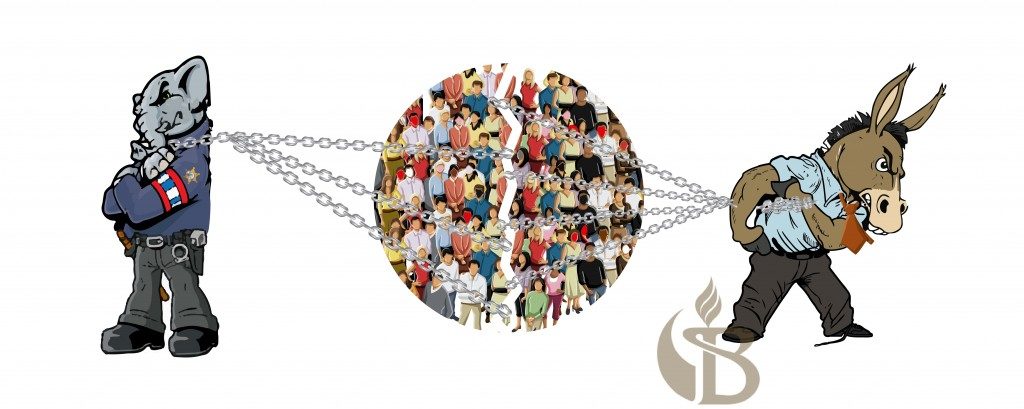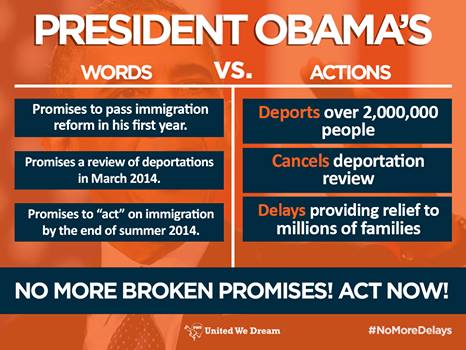
The more things change, the more they remain the same. At least in the world of immigration reform politics.
I’ve been involved in political affairs since I was a teenager. I was driven by a desire to help people victimized by a government controlled by a limited set of social and economic interests.
I was an activist in my pre-lawyer days and grew into political campaign leadership roles.
I won some battles. I lost some battles.
The war rages on.
Current battles are aplenty. This week’s news round up has highlighted a few some of these skirmishes.
The story line, as reflected in these accounts, has not changed since my first skirmish. One party ignores Latinos, the other manipulates them.
As a teenager, I was reluctant to trust my initial impressions. Still, as proud as I felt about being on the front line of local, state, and national campaigns, I felt uneasy about signs that I had supported candidates who would not adhere to promises made to certain ethnic and economic communities.
I was subtly being transformed into a Democratic Party hack.
What I Learned From Hank Lopez
At Harvard, I met Hank Lopez, a visiting scholar, who had run for a California statewide office in the 1950s.
Lopez was the first Mexican-American graduate of Harvard Law School and I would not missed any chance I had to soak up his insights and knowledge.
At the time, the law school had no Latino professors. A visiting scholar was my only opportunity to engage with a legal role model who shared our cultural roots.
Since I felt racial animus from many of my classmates, I could only imagine what Lopez, 30 years my law school senior, had endured during his days on campus.
One night, a select group of soon-to-graduate third year law students, were invited to spend an evening with Professor Lopez to discuss our future goals and ambitions.
Being that I had been politically involved, running campaigns and organizing communities, before I entered law school, our discussion naturally turned towards politics.
Even though he was part of the statewide Democratic Party ticket, his campaign was not provided the same level of support or resources as the other candidates.
He was the only statewide Democrat who lost.
We discussed his story over late night coffee.
His ordeal symbolized what I had already surmised based on my grassroots experiences.
After finishing my law studies, in addition to embarking on an immigration law practice in San Diego, I returned to political battles.
It only took a few new campaigns to reinforce my disillusionment.
In the United States, one major political party ignores Latinos. The other manipulates them.
This insight continues to be reconfirmed, election after election after election.
Watching events surrounding immigration reform unfold since Obama’s first election, this should be obvious to anyone not wearing darkly-shaded political blinders.
It’s not.
Politically Astute Immigration Reformers

Not surprisingly, however, some DREAM Act activists get it.
They grasp the disconnect between promise and policy, between sound byte and substance.
In a recent article written by Cesar Vargas and Erika Andiola, Co-Directors of the DREAM Action Coalition, addressed this chasm between immigration hope and political reality – a chasm which undermines true efforts to build an immigration law centered on family unification.
Perhaps most significantly, they did not avoid the Democratic Party’s role in the current immigration boondoggle.
They not only perceive, but also reject the misguided notion of one-party blame for the failure of reform. They grasp immigration ping pong politics.
Democrats’ Inexcusable Delay In Deportation Relief
Cesar Vargas and Erika Andiola, The Hill, June 4, 2014By delaying . . . Democrats have abdicated their responsibility to fight against arbitrary deportations and a crisis of family separation. This wait is devastating for the millions of families, which include millions of American citizens in mixed-status families, who are affected.
On one side, Republicans are alienating Latino communities by their harsh, at times insulting, anti-immigrant rhetoric, killing any sort of chance to pass immigration reform. On the other side, Obama is deporting more than 1,100 people every day, and is believed to have surpassing two million deportations. About 41 percent of those deported were parents and workers with no prior criminal record.
With the delay, Democrats and groups are endorsing, between now and Labor Day, around another 97,000 deportations and unnecessary detentions under horrid conditions of fathers and mothers who won’t be with their families.
Ultimately, it is this growing awareness, while not universal, about the realities of our two-party system that allows me some comfort that reform with compassion will be passed later, if not sooner. And promises of ill-advised temporary immigration measures, subject to abrupt legal and policy reversals, will no longer be acceptable options.
A big key, of course, is your willingness to not fall for the political manipulation and openly engage with pro-immigration reform supporters to fight for changes that genuinely benefit immigrant families.
You’re in, right?
By Carlos Batara, Immigration Law, Policy, And Politics




